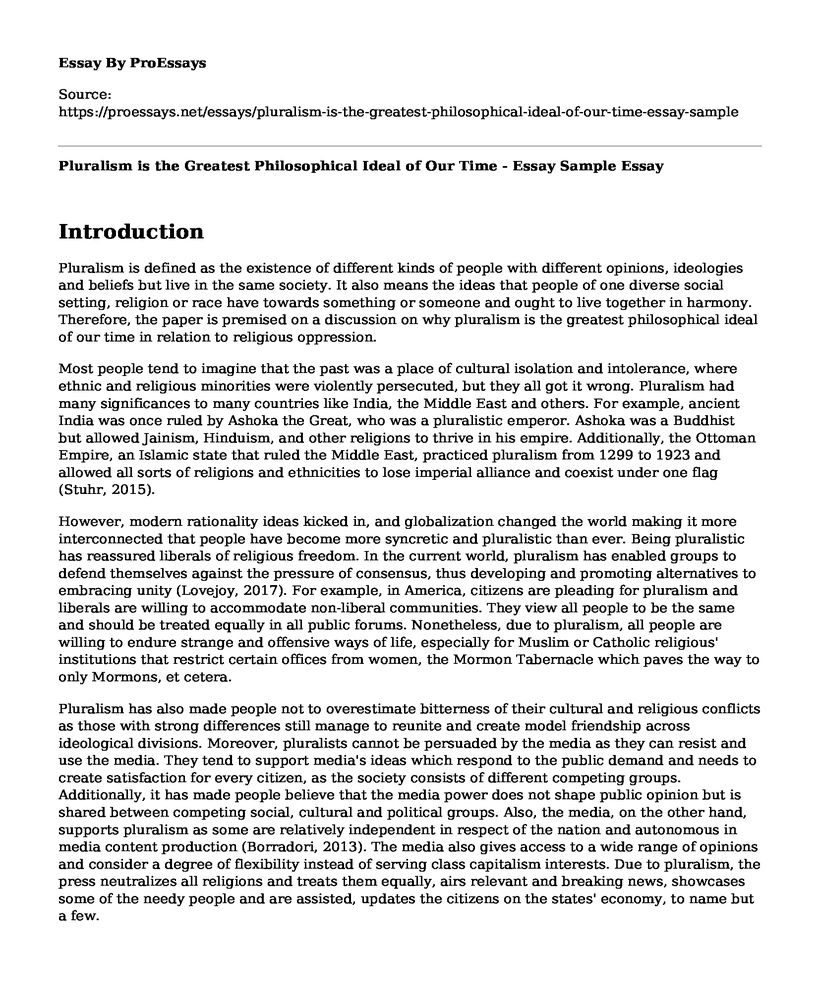Introduction
Pluralism is defined as the existence of different kinds of people with different opinions, ideologies and beliefs but live in the same society. It also means the ideas that people of one diverse social setting, religion or race have towards something or someone and ought to live together in harmony. Therefore, the paper is premised on a discussion on why pluralism is the greatest philosophical ideal of our time in relation to religious oppression.
Most people tend to imagine that the past was a place of cultural isolation and intolerance, where ethnic and religious minorities were violently persecuted, but they all got it wrong. Pluralism had many significances to many countries like India, the Middle East and others. For example, ancient India was once ruled by Ashoka the Great, who was a pluralistic emperor. Ashoka was a Buddhist but allowed Jainism, Hinduism, and other religions to thrive in his empire. Additionally, the Ottoman Empire, an Islamic state that ruled the Middle East, practiced pluralism from 1299 to 1923 and allowed all sorts of religions and ethnicities to lose imperial alliance and coexist under one flag (Stuhr, 2015).
However, modern rationality ideas kicked in, and globalization changed the world making it more interconnected that people have become more syncretic and pluralistic than ever. Being pluralistic has reassured liberals of religious freedom. In the current world, pluralism has enabled groups to defend themselves against the pressure of consensus, thus developing and promoting alternatives to embracing unity (Lovejoy, 2017). For example, in America, citizens are pleading for pluralism and liberals are willing to accommodate non-liberal communities. They view all people to be the same and should be treated equally in all public forums. Nonetheless, due to pluralism, all people are willing to endure strange and offensive ways of life, especially for Muslim or Catholic religious' institutions that restrict certain offices from women, the Mormon Tabernacle which paves the way to only Mormons, et cetera.
Pluralism has also made people not to overestimate bitterness of their cultural and religious conflicts as those with strong differences still manage to reunite and create model friendship across ideological divisions. Moreover, pluralists cannot be persuaded by the media as they can resist and use the media. They tend to support media's ideas which respond to the public demand and needs to create satisfaction for every citizen, as the society consists of different competing groups. Additionally, it has made people believe that the media power does not shape public opinion but is shared between competing social, cultural and political groups. Also, the media, on the other hand, supports pluralism as some are relatively independent in respect of the nation and autonomous in media content production (Borradori, 2013). The media also gives access to a wide range of opinions and consider a degree of flexibility instead of serving class capitalism interests. Due to pluralism, the press neutralizes all religions and treats them equally, airs relevant and breaking news, showcases some of the needy people and are assisted, updates the citizens on the states' economy, to name but a few.
Conclusion
In summary, pluralism is the views of people in a society to live in harmony. The people in the past, especially in India and Ottoman, had good leaders who practiced pluralism and met the religious rights of every person, majorly between 1299 and 1923. Nonetheless, globalization changed the world and people became more pluralistic than ever. The media also supports pluralism as they consider the degree of flexibility rather than serving capitalists' interests.
References
Borradori, G. (2013). Philosophy in a time of terror: Dialogues with Jurgen Habermas and Jacques Derrida. University of Chicago Press.
Lovejoy, A. (2017). The great chain of being: A study of the history of an idea. Routledge.
Stuhr, J. J. (2015). Pragmatism, postmodernism and the future of philosophy. Routledge.
Cite this page
Pluralism is the Greatest Philosophical Ideal of Our Time - Essay Sample. (2022, Jun 19). Retrieved from https://proessays.net/essays/pluralism-is-the-greatest-philosophical-ideal-of-our-time-essay-sample
If you are the original author of this essay and no longer wish to have it published on the ProEssays website, please click below to request its removal:
- My Fiancee, the Greatest Woman in the World - Essay Sample
- Essay Sample on Freedom In Speech
- Essay Sample on the 1920s Flappers
- Essay Sample on Inaccurate Representations of Minorities in U.S. Films
- Essay Sample on Parents of Autistic Children: Perceptions and Use of Supplemental Treatments
- Humans: Social and Political Beings and Their Realities - Essay Sample
- Essay Exanoke on Coca-Cola's Ethical Dilemmas: Violations, Analysis, and Solutions







